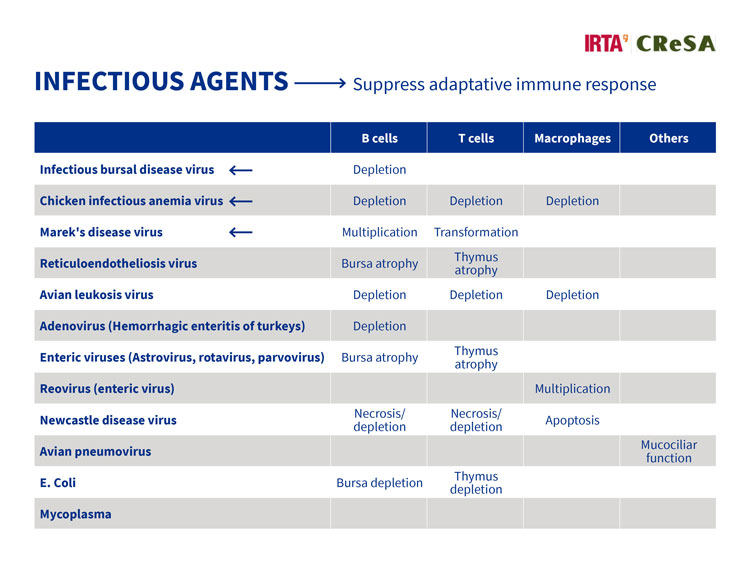Avian immunosuppressive diseases are often undetected and underestimated, but they have a significant direct and indirect economic impact by affecting flock performance, clinical disease, vaccine failures and increased use of antibiotics. Mishandling, stress, mycotoxins, and several pathogens, such as Infectious Bursal Disease virus, are the main causes of immunosuppression.
During the World Poultry Virtual Congress by HIPRA, Dr. Miquel Nofrarias explained the main causes and the impact of avian immunosuppressive disease on the poultry industry (see the recorded webinar below).
The role of the immune system is to fight against external agents and provide effective protection against infective microorganisms. There are two lines of defence, innate (or non-specific) immunity and adaptive (or specific) immunity.
Specific organs and cells are involved in the birds’ immune system, which are:
- Primary lymphoid organs: composed of the bursa of Fabricius, the thymus and bone marrow.
- Secondary lymphoid organs: composed of the spleen, circulating lymphocytes and several lymphoid cell aggregates along the gut, trachea, oesophagus, harderian gland, tonsils, etc.
What is immunosuppression?
It is a temporary or permanent state of depression of the immune system, meaning that there is a suboptimal immune response (innate, cellular or humoral immunity).
Immunosuppression is not a disease and it has no clinical signs, it is an expression or a consequence of something damaging or impairing the immune system.
How can we recognize immunosuppression?
There is no specific indicator that confirms it, but there are several factors that could point towards possible immunosuppression:
- Atrophy of the lymphoid organs.
- Increased mortality.
- Less uniformity of the flock.
- Poor performance: increased FCR, carcass condemnation…
- Lower antibody titre after vaccination or vaccine failure.
- Increased bacterial infection.
Main causes of immunosuppression
- Management practices: such as suboptimal incubation conditions, temperature, ammonia, transport, etc., which stress the birds and deplete the immune response.
- Mycotoxins: besides affecting the immune system, they also affect metabolic routes, reproduction, egg quality, intestinal function…
- Infectious agents: Immunosuppression is usually the consequence of a depletion of B and T cells by pathogens.

Impact of immunosuppression
Immunosuppressive viral diseases have an important economic impact due to direct but also to indirect losses.
Direct losses are related to specific mortality, which will depend on the virulence, age and breed of the birds and the presence or absence of passive immunity. In addition, immunosuppression has a high impact on flock performance, with impaired growth and condemnation of carcasses.
On the other hand, immunosuppression leads to secondary infections that will increase the use of antibiotics to control them, which is a major concern for human health.
Furthermore, the efficacy of vaccinations is reduced, causing indirect economic loss and increasing the risk of infection in unprotected animals.
Studies conducted by Mc Ilroy et al. (1989) documented the economic impact of broiler flocks with Infectious Bursal Disease subclinical infection compared to flocks without lesions, showing a 14% decrease in financial return, an 11% reduction in net income per 1000 birds and +0.8% increase in flock mortality.
In addition, McNulty et al. (1991) studied the impact of CAV seropositive broiler flocks at slaughter compared to CAV seronegative flocks, showing a 13% smaller net income per 1000 birds, a 2% worse feed conversion ratio and a 2.4% lower average weight.
Conclusions
- Immunosuppression can result in significant direct and indirect economic losses.
- It is caused by suboptimal environmental conditions, poor management practices, mycotoxins and several infectious diseases such as Infectious Bursal Disease.
- The key to prevention of immunosuppression is to reduce stress, maintain appropriate management practices and follow strict vaccination programmes.
References:
- McIlroy et al. (1989). Economic Effects of Subclinical Infectious Bursal Disease in Broiler Production. Avian Pathology 18(3): 465-80.
- McNulty et al. (1991). Economic Effects of Subclinical Chicken Anemia Agent Infection in Broiler Chickens. Avian Diseases, 35(2), 263-268.
- Immunosuppressive viral diseases in poultry

